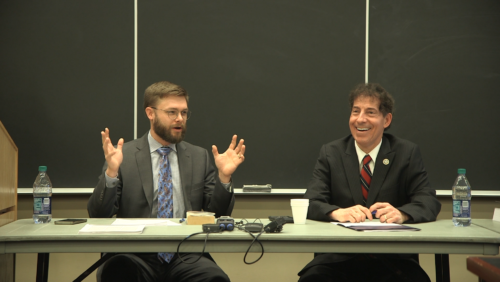Distinguished Visitor Paul Smith, Rep. Jamie Raskin and Trent England Debate “Electoral College v. Popular Vote”
January 26, 2018

Trent England and Rep. Jamie Raskin debate the merits of the electoral college versus the popular vote in U.S. presidential elections at a panel discussion at Georgetown Law on January 24.
Trent England and Rep. Jamie Raskin debate the merits of the electoral college versus the popular vote in U.S. presidential elections at a panel discussion at Georgetown Law on January 24.
Should America change the way it elects a U.S. President? “Electoral College v. Popular Vote” — co-hosted by Georgetown Law’s Federalist Society and Students for Democratic Reform — on January 24 debated that question.
U.S. Rep. Jamie Raskin (D-Md.) and Trent England, executive vice president of the Oklahoma Council of Public Affairs, argued the pros and cons. Georgetown Law Distinguished Visitor from Practice Paul Smith, who argued the Wisconsin gerrymandering case of Gill v. Whitford in the Supreme Court in October, acted as moderator.
Raskin supports the National Popular Vote Interstate Compact — in which a group of states and the District of Columbia pledge to award all electoral votes to the presidential candidate who wins the popular vote. The plan, he said, does not abolish the Electoral College but changes the way the college is used to advance the national popular vote.
“Our elections are not democratic; they don’t choose the candidate who wins the most votes…” said Raskin, who noted that in two of the last five U.S. presidential elections, the popular vote loser has prevailed in the Electoral College. “We don’t have a democratic system for electing the president, which comes as quite a shock to maybe a majority of American people who think that we’ve got one.”
In the vast majority of the country, Raskin contended, there’s no real presidential election to speak of. Three of the four biggest states — New York, Texas, and California — are “safely” red or blue states; only Florida has a real competitive election, he said.
And no other country, Raskin said, would set up a system this way today.
But Trent England — who heads a state-based public policy research organization that analyzes issues with respect to limited government, individual liberty and a free market economy — contended that other countries such as India have Parliamentary systems that resemble the electoral college or have multi-step selections of their chief executive.
“[The Electoral process] isn’t some outlier…,” England asserted. “We are talking about representing a large and diverse nation, something that is obviously inherently more complicated than a state legislative district or even a governor’s race.”
Does the system work? Is it stable? Does it function? The Electoral College system, while imperfect, has been successful, he noted.
And the reality is that in a close election today, whoever loses will call the system into question, England said. “The system we have today, imperfect as it is, swing states tend to be states where you have the most political accountability, by virtue of the fact that you have the closest thing to political parity. You have less political accountability where you have one-party control…most election fraud happens in one party controlled [states].”